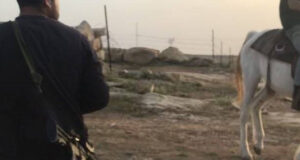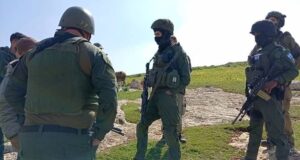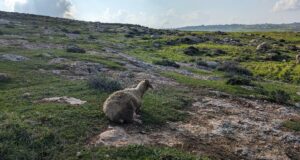by Alistair George
22 November 2011 | International Solidarity Movement, West Bank
As thousands of Israeli settlers and Zionists crowded into Hebron on Friday night, November 19th, and Saturday for Shabbat Chaye Sarah – celebrating Abraham’s biblical purchase of land on the site of the Ibrahimi Mosque, some Palestinian neighbourhoods experienced a surge in settler attacks.
Wadi Al-Hussain, a valley situated on the edge of Hebron’s old city was the focus of attacks. The Jaber family lives far down the hill, near to the road reserved for settler traffic leading from Kiryat Arba, an illegal Israeli settlement home to around 7,000 people, to the Ibrahimi mosque in the old city. Their house faces the settlement a few hundred metres away on the opposite side of the valley. They have experienced many settler attacks but Saturday was a particularly harrowing day for the 17 Palestinians of several generations which live in the same large house.
Um Safaway Jaber, 28, described what happened to the family.
“We were attacked around 10 times – at one point there was more than 100 settlers outside. The soldiers put a curfew on us and didn’t allow us to leave the house but the settlers were free to use this road. We didn’t accept this curfew because the settlers were attacking us and we didn’t want stones to be thrown at the house. We shouted at the settlers, they shouted at us and said bad words against us. They said ‘we will kill you’, not just harassment – it was threats. We were lucky that a journalist was in the area filming, although the journalist was bitten by settler’s dog. The settlers attacked the journalist and the guys [Palestinians] went to defend the them.”
Um Safaway Jaber’s husband was arrested by the Israeli military.
His brother, Moutasem Jaber, 21, said “The soldiers forced their way into the house and arrested my brother because he was trying to protect the women and the family from the settlers. Then the settlers went to the police station to make a complaint against us that we were attacking them! After that they came back and had a demonstration outside the house. They brought video cameras to film the reaction of the Palestinian families and they tried to attack us. “All of us went inside and we didn’t go out because we didn’t want any more trouble but the soldiers came and they put the whole family in one room, they closed the door on us and they didn’t allow us to leave the room from 1pm to 8pm. After 8pm, the soldiers left the house – we went out and we didn’t see any settlers outside, just lots of soldiers.”
Moutasem’s mother, 63 year old Um Tariq Jaber, added that ” The family was following the Israeli decision not to open our shop or be in the street but the settlers still came and attacked us.”
Many families were targeted by settlers in Wadi Al-Hussain yesterday but the Jaber family was seemingly singled out for a heightened level of violence. A member of the family, Hani Jaber, was released by the Israeli authorities on 18 October 2011 as part of the prisoner exchange deal that saw 477 Palestinian prisoners released (with a further 550 to be released in a second phase thought to be in December) in exchange for the release of Israeli soldier Gilad Shalit, who was captured by Hamas in 2006. Hani Jaber served 18 years of a life sentence after being found guilty of killing a settler from Kiryat Arba.
The Jaber’s house was also attacked on the day of his release and Ibtisam Jaber, 33, Montasem’s sister-in-law, was beaten and suffered a miscarriage three days later. “The settlers came and attacked the house. Ibtisam lost her baby, nobody else was here because we were celebrating,” said Moutasem.
“I told the police that they wanted to kill him,” said Moutasem – “all of this harassment was included in the complaint to the police but we don’t expect them to do anything. The police said that the case is ongoing so we’ll see. Hani grew up in this house and now he can’t come here because he’s afraid for his life.”
Alistair George is a volunteer with International Solidarity Movement (name has been changed).
 International Solidarity Movement Nonviolence. Justice. Freedom.
International Solidarity Movement Nonviolence. Justice. Freedom.


